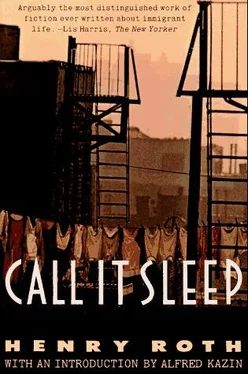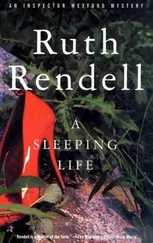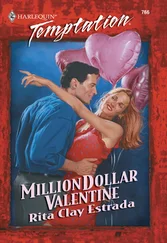On the high lean-to that covered the stairway of the next roof but one, stood a boy, kite-string in hand, spindle rattling at his feet, and in the air a short distance from him, a rag-tailed, crimson kite ducked and soared. His blond hair, only a shade less fair than his brow, hung over his brow like a gold claw. He was snub-nosed; his cheeks had a faint flush and his eyes were blue. Teeth over lip, head lifted into light, he watched his kite intently, now paying out string, now jogging it to newer heights. It swayed slowly, tacking into upper air; there it steadied and drew away with sagging glint of string.
Watching him, David felt a bond of kinship growing up between them. They were both alone on the roof, both inhabitants of the same realm. That was a bond between them. But David could tell by looking at him, that the other had come up to the roof out of assurance — this was only another phase of his life. David himself had come up tentatively, timidly, because there was no other place to go. He suddenly began wishing he could know this carefree, confident stranger. But he had never seen his face before — that blond hair, those blue eyes didn’t belong to Ninth Street. How could he begin? Mentally he went over the various ways of striking up an acquaintance. He wished that he had something to offer him — the cookies he had thrown away yesterday or a bit of string. Longingly, he watched him.
With one hand poised as though the string’s steadiness depended on his balance, he felt behind him for the sloping floor under his feet and then sat down. He leaned back contentedly, whistling short fitful notes. David couldn’t make up his mind whether he ought to come out of hiding or content himself with merely watching the kite. He watched the kite. And suddenly stared—
It was hard to tell what street they were nearer to, Eleventh or Twelfth but he could see them clearly. There were two, perhaps three boys, and with bodies bent low, they were crawling over the roofs, now emerging now ducking behind chimney pots and skylights. Another few seconds and they were under the hanging arc of the kite-cord — although far below it. He glanced sharply at the owner of the kite. Unaware of any danger, he lay sprawled back, still whistling up at the sky. When David looked back to the distant ones, they had already risen from hands and knees and were vigorously twirling something in the air.
“Pssst!” He leaped out of hiding. “Pssst!” Not daring to speak, he made frantic motions of dragging in the kite-cord.
“W’at?” The other scrambled to his feet. “W’atsa matter?” And when David pointed vehemently in the direction of the distant marauders, “Cheesis! Dey’re sling-shootin’ it!” he shouted excitedly. “Cheesis!” And as fast as his hands could go, began yanking in the line.
The slings had been thrown. Both missed, fell, doubling back on the strings they trailed. They flung them up again. But as the kite came sailing home, it rose higher and higher — further from their range. At last the owner rested, babbling exultantly.
“Cheesis! See ’em! Dere dey go! Hidin’ back o’ dat! Bot’ of ’em! Didn’ get it dough. Lousy micks, nearly slung it! Waaa!” he screeched, thumbing his nose at the two distant figures. “Ya Irish mutts! Waid’ll I git ya, I’ll rap de piss odda ye!”
What abuse the others bawled back in reply was too faint to hear, but David could see them wagging their hands under their chins.
“Ha! Ha! Look at ’em!” the blond one yelled over to him. “See w’at dey’re doin’? Dey t’ink I’m a Jew! See ’em! Dopy mutts! Dopy mutts,” he yodeled again. “Dopy mutts!” And then glancing at his feet. “Chee! Looka my kite-cord — all twissed up! Hey, c’mon over, will ya? C’mon, give us a hand.”
David shook his head.
“Wottsa madder, can’tcha talk?” The other stared at him.
Nodding vigorously, David pointed down to the roof at his feet.
The other grinned, face lighting up as though he understood. “C’mon,” he whispered throatily, head hooking the air. “It’s easy!”
— Better not.
There was something hazardous about climbing over the wall on a roof, especially with the deep pit of the air-shaft near at hand. The thought made one dizzy.
“Go over dat way,” the other urged.
(—Ain’t scared. Ain’t gonna be!) He tiptoed breathlessly across the crackling tin, climbed over the low wall onto the second roof. Another wall and the blue eyes gazed curiously down at him over the edge of the shed.
“Who ye scared o’?”
“Nott’n. I live on de top-fluh. I did’n’ wan’ my modder sh’d hea’ me.”
“Oh. Wouldn’ she letcha stay hea?”
“No. She’ll make me comm donn.”
“C’mon up hea’ den. Nobody c’n see ye.”
“So hoddy yuh go?”
“Hop up on ’at liddle winder. Den dese big bolts. See ’em?”
David essayed them. The other, one eye on his kite, lent a helping hand. “Sit onna noospaper,” he invited when David had climbed up; “Hol’ me kite will ye an’ I’ll git me cord onna spool.”
“Yea.”
“Don’ leggo of it.” He gave the string into David’s keeping. “It’s got some pull.”
“Gee!” The tug on his hand was almost alive. “It flies!”
The other laughed. “Sure it flies. Yuh c’n sit down wid it.” He squatted down himself, began undoing the snarl of string at his feet. “De lousy micks! Look wat dey made me do! G’wan sit down!”
“Don’ your modder care if yuh come op hea?”
“She? Naw! She woiks!”
“Oh! W’ea’s yuh foddeh?”
“I ain’t got none. Me old man usetuh woik on de railro’. But he wuz squeezed between two trains when I wuz liddle an’ we lived in Paterson. Wot’s yuh name?”
“Davy. Davy Schearl.”
“My name’s Leo Dugovka. I’m a Polish-American. You’re a Jew, ain’tcha?”
“Y-Yea.”
“Say, wuz yew wit’ dem kids w’at wuz runnin’ on de roof yestiddy?”
“No I wuzn’t,” vehemently.
“I’ll knock dere block off if I ketch ’em nex’ time. Dey nearly made de plaster fall down.”
“Yea,” David’s heart warmed to Leo’s. “Y’oughta gib’m. Gib’m good!”
“Jist waid’ll I gid ’em.” Leo worked rapidly at the spindle. “I’ll bust ’em one.”
“I never seen yuh in dis block. Yuh livin’ hea long?”
“Naa, we usen’t to live hea, but me ol’ lady got a job in ’at big bank on sixt’ and Avenee C — yuh know wit dem swell w’ite stones an ’gold ledders — Foist National.”
“Yea,” said David wonderingly. “Wit’ iron bars in id ’n’ dat big clock. Does she woik wid all dat money?”
“Yea, she cleans all de desks an’ awffices ’n’ ev’yt’ing.”
“Oh? So who gives yuh to eat?”
“I takes it myself.”
“Gee!” David breathed in the enormous freedom. “Yuh gonna comm up hea alluh time?”
“Naw! I hangs out on wes’ elevent’. Dat’s w’ea we lived ’fore we moved. It’s a mick block, only some of de Hogan’s alley kids is in de All Saints Camp.”
“Oh!” disappointedly. “Gee, dat’s far, wes’ elebn’t.”
“Yeah, but I got skates.”
“Skates, gee!” There was no end to Leo’s blessings — no father, almost no mother, skates.
“Git dere in a minute wit’ ’em. You got a pair?”
“No.”
“Wyntcha git a pair an’ hang out wit’ me.”
“I can’t.”
“Aintcher ol’ man livin’?”
“Yea, but he wouldn’ buy.”
“Wyntcha ast yer ol’ lady.”
“She can’t.”
“Chees! Jews never buys nutt’n fer deyr kids.”
David searched the horizon for something to fill in the awkward pause. “Dey ain’ dere now, doze — doze micks,” he ventured.
Читать дальше












